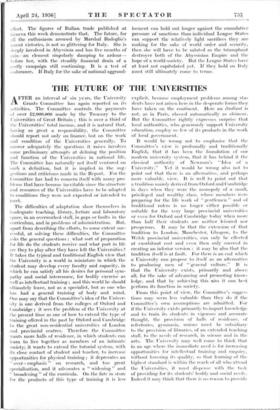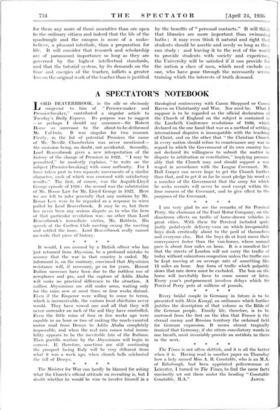THE FUTURE OF THE UNIVERSITIES
AFTER an interval of six years, the University Grants Committee has again reported on its activities. The Committee controls the payments of over 12,000,000 made by the Treasury to the Universities of Great Britain ; this is over a third of the Universities' total inco-me, and it is natural that, having so great a responsibility, the Committee should report not only on finance, but on the work and condition of the Universities generally. To answer adequately the questions it raises involves some preliminary attempts at defining the position and function of the Universities in national life. The Committee has naturally not itself ventured on such a definition, but it is implied in the sug- gestions and criticisms made in the Report. For the Conunittee has had to concern itself with many pro- blems that have become inevitable since the structure and resources of the Universities have to be adapted to conditions they were not expected or intended to meet.
The difficulties of adaptation show themselves in inadequate teaching, library, lecture and laboratory space, in an overworked staff, in gaps or faults in the curriculum, and in problems of administration. But, apart from describing the efforts, to some extent suc- cessful, at solving these difficulties, the Committee asks the general questions : what sort of preparation for life do the students receive and what part in life are they to play after they have left the Universities? It takes the typical and traditional English view that the University is a world in miniature in which the student may develop every faculty and capacity, in which he can satisfy all his desires for personal sym- pathy and social intercourse, for bodily exercise as well as intellectual training ; and this world he should ultimately leave, not as a specialist, but as one who has had a general training of body and mind. One may say that the Committee's idea of the Univer- sity is one derived from the colleges of Oxford and Cambridge ; it sees the problem of the University at the present time as one of how to extend the type of training offered in the past by Oxford and Cambridge to the great non-residential universities of London and provincial centres. Therefore the Committee wants more halls of residence, in which students can learn to live together as members of an intimate society;_ it wants to extend the tutorial system, with its close contact of student and teacher, to increase opportunities for physical training ; it deprecates an 'over - emphasis" on research, and too great specialisation, and it advocates a " widening " and " broadening " of the curricula. On the fate in store for the products of this type of training it is less explicit, because employment problems among stu- dents have not arisen here in the desperate forms they have taken on the continent. Here an etudiant is not, as in Paris, classed automatically as chOmeur. But the Committee rightly expresses surprise that local authorities, who generously support University education, employ so few of its products in the work of local government.
It would be wrong not to emphasise that the Committee's view is profoundly and traditionally English, that it has been the foundation of our modern university system, that it has behind it the classical authority of Newman's "Idea of a University." Yet it would be wrong also not to point out that there is an alternative, and perhaps more valuable, view. It is well to point out that a tradition mainly derived from Oxford and Cambridge in days when they were the monopoly of a small, privileged and wealthy class, whose members were preparing for the life work of "gentlemen " and of traditional rulers is no longer either possible or suitable for the very large provincial universities or even for Oxford and Cambridge today when more than half their students are neither leisured nor prosperous. It may be that the extension of that tradition to London, Manchester, Glasgow, to the Welsh provincial universities, can only be effected at exorbitant cost and even then only succeed in creating an inferior version : it may be also that the tradition itself is at fault. For there is an end which a University can propose to itself as an alternative to producing men of "general culture." It is that the University exists, primarily and above all, for the sake of advancing and promoting know- ledge, and that by achieving this aim it can best perform its function in society.
From this point of view, the Committee's sugges- tions may seem less valuable than they do if the Committee's own assumptions are admitted. For if the University exists primarily to impart knowledge and to train its students in vigorous and accurate thought, the provision of halls of residence, of refectories, gymnasia, unions must be subsidiary to the provision of libraries, of an extended teaching staff, to the needs of research, in science and in the arts. The University may well come to think that in an age where the immediate need is for increasing opportunities for intellectual training and enquiry, without lowering its quality, so that learning of the highest standard is within the reach of all who attend the Universities, it must dispense with the task of providing for its students' bodily and social needs. Indeed it may think that there is no reason to provide for them any more of those amenities than are open to the ordinary citizen and indeed that the life of the quadrangle and the campus is more of a make- believe, a pleasant interlude, than a preparation for life. It will consider that research and scholarship arc of paramount importance so long as they are governed by the highest intellectual standards, and that the tutorial system, by its demands on the time and energies of the teacher, inflicts a greater • loss on the original work of the teacher than is justified by the benefits of " personal contacts." It will think that libraries are more important than swimming baths ; it may even think it natural and right that students should be ascetic and needy so long as they can study : and leaving it to the rest of the world to provide students with society and experience, the University will be satisfied if it can provide for the nation a class of men, which need exclude no one, who have gone through the necessarily severe training which the interests of truth demand.



















































 Previous page
Previous page